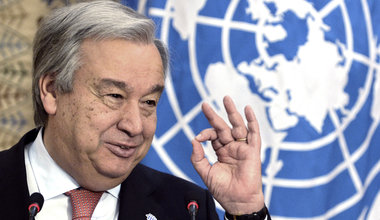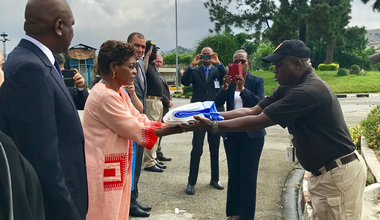UNOCI organises intercommunty dialogue session in Neko

Traditional chiefs, elected representative, local dignitaries, women and youths from the different communities in Néko village, situated at 10 km from Lakota, in the Loh-Djiboua region in centrewest Côte d'Ivoire, have made a commitment to strengthen social cohesion in their village. They made this commitment at the end of an intercommunity dialogue session organized at the youth centre in Néko, on the 18, 19 and 20 November 2015 by the United Nations Operation in Côte d'Ivoire (UNOCI) following violent incidents in the locality on 8 and 9 November 2015, which resulted in one death and the destruction of property.
The Special Representative of the United Nations Secretary-General, Mrs Aïchatou Mindaoudou, the Director General for Solidarity and Social Cohesion, representing the Ministry of Solidarity, Family, Women and Children, Mr. Doh Dibahi Marcellin, the Director-General of the Observatory for Solidarity and Social Cohesion, Mrs Elise Yra Ouattara, the Prefect of Lakota Department, Yahaya Coulibaly, representatives of the local security forces, took part in the final session of the intercommunty dialogue. On the eve of the final session, the African Union Representative in Côte d'Ivoire, Mrs Josephine Mayuma Kala, had participated in the discussions which were attended by local administrative and community authorities.
During three days, more than 300 participants discussed how best they can contribute to the return of lasting social cohesion in their village. The discussions were organized within four workshops comprising women, youths, elected local officials and dignitaries as well as traditional and religious authorities. At the end of the various workshops, the rapporteurs of the different groups presented the actions they intend to take to promote peace and social cohesion.
In his address to the gathering, the youth spokesperson, Mr. Bado Emmanuel, outlined the challenges that they face including the absence of mutual respect and tolerance between the youths from the different communities and not respecting the law. As part of their recommendations, they made a commitment to «live together despite their political ethnic and religious differences and to set up a committee where youths can meet and discuss different issues».
The spokesperson for the women, Mrs Soumahoro Matogoma, said that the women had decided « advice their sons on how to behave and sensitise other villagers on the importance of returning stolen property ». The women also asked for technical and financial support to create a federation of women's associations in Néko.
For his part, the spokesman of the elected officials and dignitaries, Lt Dago Alphonse, highlighted the difficulties linked to education, land issues and youth unemployment. « Local elected representatives and dignitaries have a particular responsibility to be committed to promoting cohesion between the communities in Néko and promoting peace when there is tension whatever communities are involved in the disputes», said Mr. Dago.
The commitment of the traditional and community chiefs and the religious leaders was to « meet frequently in order to learn once more how to live together in order to ensure social cohesion » according to the spokesperson, Mr. Agodio Ben, who announced their recommendations.
The representative of the Ministry of Solidarity, Family, Women and Children, Mr. Doh Dibahi Marcellin, highlighted the importance of the return of peace to the village. On behalf of the Minister of Solidarity, Family, Women and Children, he thanked the Special Representative for her efforts to promote social cohesion.
The Head of UNOCI, Mrs Mindaoudou in her address to the gathering, welcomed the mobilisation of traditional chiefs, local elected prepresentatives, dignitaries, women and youths from the different communities in Néko. She talked about one issue which was raised by the different groups, which is the "indiscipline among the youth and lack of self-control». In this regard, the Special Representative expressed the hope that local youths will change their behavior, adding that UNOCI can help them to do so by organizing training sessions on conflict management and sensitization.
In his closing address, the Prefect of Lakota, Yahaya Coulibaly stressed the need for young people to respect local administrative and traditional authorities, and for everyone to respect the law, value farming land and address youth unemployment, as well as the need « for inclusive cohabitation in order to live together peacefully ».
The ceremony included artistic performances including one by the Bouaké theatre group « C'est ça la même » which accompanies UNOCI in its senstisation activities to promote social cohesion.
 UN
UN United Nations Peacekeeping
United Nations Peacekeeping








